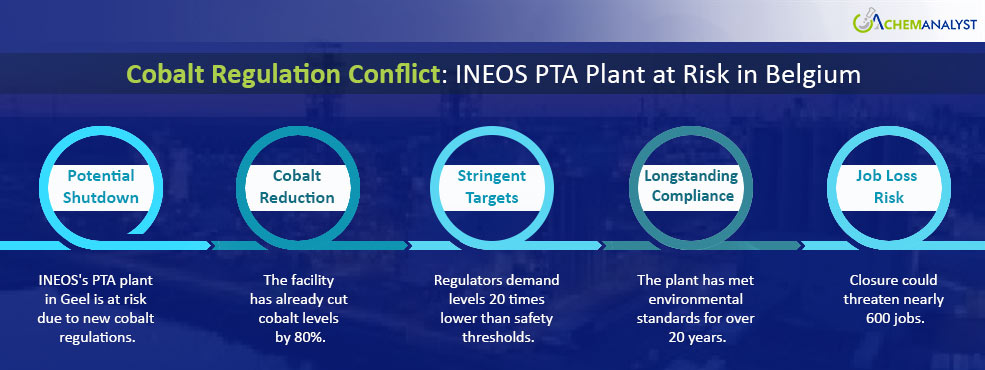Welcome To ChemAnalyst

The INEOS Purified Terephthalic Acid (PTA) plant located in Geel, Belgium is at risk of being shut down as regulators aim to impose stringent environmental targets. These targets are deemed unattainable for a facility that has already made a significant commitment to reducing cobalt levels by 80%. Despite this substantial effort to meet environmental standards, the potential for closure remains a pressing concern for the plant's operations.
The plant, which has successfully operated within all environmental standards for the past two decades, is now facing demands to significantly lower its cobalt levels. Regulators are requesting a reduction to a limit that is 20 times lower than what expert studies have determined to be necessary for safety and environmental protection. Furthermore, this new requirement is 100 times more stringent than the cobalt limits currently enforced in Poland. This situation raises concerns about the feasibility of meeting such stringent targets, particularly for a facility that has demonstrated a longstanding commitment to environmental compliance.
The plant is one of the few remaining facilities of its kind in Europe and is distinguished as the most efficient in the region, featuring the lowest carbon footprint among its peers. Purified Terephthalic Acid (PTA) is an essential feedstock for the global polyester industry, which is responsible for producing a wide range of affordable materials that are crucial for human well-being. These materials include textiles and garments, as well as packaging for food and beverages.
Moreover, PTA is notable for its high recyclability and reusability, making it an integral part of the circular economy. Its role in providing sustainable solutions is increasingly important as Europe seeks to address long-term sustainability challenges. The continued operation of this plant is vital not only for the local economy but also for supporting the broader goals of environmental responsibility and resource efficiency in the region.
The plant has been in operation for more than 20 years, consistently achieving full compliance with all environmental regulations throughout its tenure. The production process relies on a cobalt catalyst, which inevitably leads to microscopic traces of cobalt being present in the wastewater generated by the facility. Historically, the plant has been authorized to maintain cobalt levels in the water at up to 1,000 micrograms per liter. Notably, the typical emission levels have consistently been around 250 micrograms per liter, demonstrating the plant’s effective management of emissions and its commitment to environmental stewardship. This long-standing adherence to regulatory standards highlights the facility's dedication to minimizing its ecological impact while delivering essential products.
The site had initially agreed to lower the maximum permitted cobalt level from 1,000 micrograms per liter to 500, and then further down to 120 micrograms by 2027, a change that would require an investment of over €20 million. This agreement was sanctioned by the local government. However, the decision was subsequently challenged by two non-governmental organizations (NGOs), leading to a judicial review and the establishment of a new regulatory cobalt limit that is deemed completely unattainable. This new limit is 20 times lower than what studies indicate is necessary and 100 times more stringent than the equivalent limits set in Poland. Furthermore, the European Water Framework Directive does not even classify cobalt as a priority substance, and neither France nor Germany has imposed any restrictions on cobalt levels, highlighting the disparity in regulatory approaches across Europe.
If the plant's permit is not renewed and closure is enforced, nearly 600 jobs could be at risk.
In response to the situation, Sir Jim Ratcliffe, Chairman of INEOS, remarked, “This situation exemplifies a troubling pattern across Europe. Regulators are overly accommodating the demands of NGOs that aim to use regulations to undermine the European chemical industry. Their expectations are deliberately set at impossible levels, which will not enhance environmental conditions. Rather, these actions will lead to significant deindustrialization and jeopardize the livelihoods of thousands of hardworking individuals.”
We use cookies to deliver the best possible experience on our website. To learn more, visit our Privacy Policy. By continuing to use this site or by closing this box, you consent to our use of cookies. More info.
